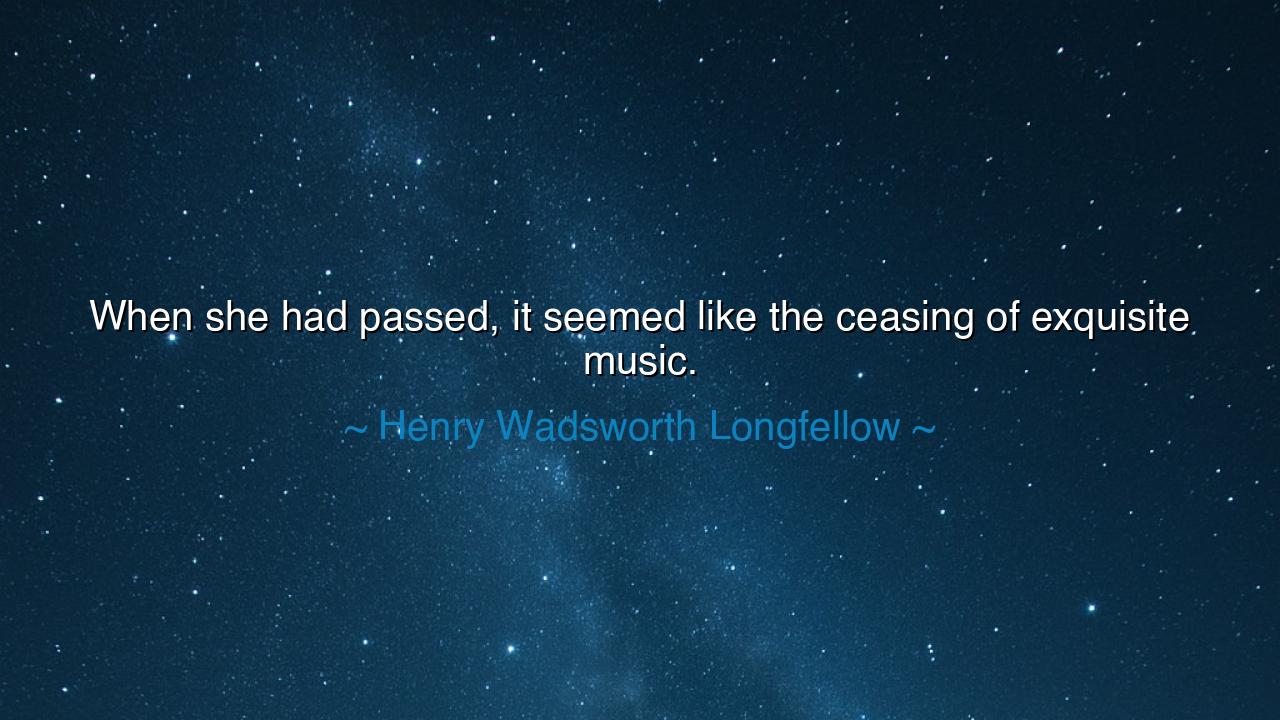
When she had passed, it seemed like the ceasing of exquisite






The words of Henry Wadsworth Longfellow — “When she had passed, it seemed like the ceasing of exquisite music.” — are not merely the lament of a poet, but a hymn to the fleeting nature of beauty and love. He likens the presence of a woman, radiant in grace, to music, that divine art which touches the soul beyond speech. And when she departs, when her light is gone from before him, the silence that follows feels like the end of a symphony — sudden, aching, unbearable. It is not just the absence of sound, but the absence of something that gave rhythm and meaning to existence itself.
For the ancients, music was more than melody; it was the very harmony of the cosmos. The Pythagoreans spoke of the “music of the spheres,” the inaudible harmony by which the stars themselves moved. To compare a woman’s presence to exquisite music is to say that she was no ordinary soul, but a force that brought order, beauty, and sweetness into the world. Her departure, then, is not simply loss, but dissonance — the unraveling of harmony, the return of silence where once the heavens sang.
We see this truth echoed in history through the story of Dante Alighieri, whose muse Beatrice inspired him beyond measure. When she walked upon the earth, his poetry soared with divine fire; when she passed from life, his soul was plunged into silence, and yet from that silence arose The Divine Comedy. The death of Beatrice was to Dante what Longfellow describes — the ending of exquisite music. Yet it was also the beginning of a new composition, forged in grief, in which her memory continued to sing across eternity.
The image of music ceasing speaks also to the universal experience of loss. When a beloved departs — whether by death, or distance, or the severing of affection — the world itself feels muted. The familiar colors grow dull, the rhythms of life stumble. Just as a symphony without its final chord feels incomplete, so does the heart feel torn when deprived of one whose presence gave life its melody. Longfellow’s words are not only personal, but universal: all who have loved and lost know this silence.
Yet within the sorrow lies a profound teaching. Though music may cease, its echoes remain. A song once heard does not vanish utterly, but lingers in memory, shaping the heart long after the last note. So too with love, with friendship, with beauty: even when the source is gone, its imprint endures. The silence left behind is painful, but it is also a reminder of what was once so deeply precious. Without the sweetness of the song, we would not feel the weight of its absence.
The lesson is this: cherish the music while it plays. Do not wait until the silence to realize its worth. Honor the presence of those who bring beauty to your days, for time is fleeting, and the melody of their laughter, their kindness, their companionship may cease when you least expect it. To live with gratitude and attentiveness is to savor the song before it fades.
And when silence does come, as it must to all, do not despair. Instead, let the echoes guide you. Remember that even in absence, beauty has the power to endure in memory, in story, in the transformation it wrought within your soul. Longfellow reminds us that the ceasing of exquisite music is not only an end, but a call to remember, to honor, and to carry forward the harmony that once was.
Thus, O listener, live as one who both hears and remembers. Treasure the melodies of love and beauty in the present, and when silence comes, let it not destroy you, but inspire you to create new songs in their honor. For though the music ceases, the soul that has once heard it will never again be silent.






AAdministratorAdministrator
Welcome, honored guests. Please leave a comment, we will respond soon